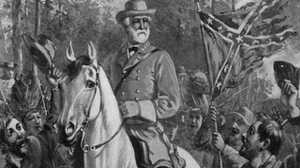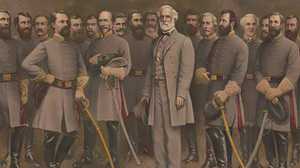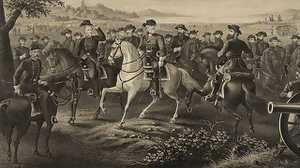The Army of Northern Virginia
The Army of Northern Virginia, commonly referred to as "Lee's Army," was the Confederacy's main fighting force in the Eastern Theater of the Civil War. Strategically, the Eastern Theater was arguably the most important battleground of the Civil War; comprising the states of Virginia, West Virginia Maryland, Pennsylvania, and the District of Columbia, this zone was home to the capital cities of the Union and the Confederacy, as well as site of the War's most famous battles.

Originally called the Confederate Army of the Potomac, the confederate forces were renamed the Army of Northern Virginia when Robert E. Lee assumed command on June 1, 1862, in a battle to defend the city of Richmond from Union forces. Before taking command of the Army of Northern Virginia, Lee had had limited success, suffering a string of defeats in the early stages of the War. But in Richmond, Lee sought to inspire his troops by drawing upon Virginia's storied military tradition, telling them that "every man has resolved to maintain the ancient fame of the Army of Northern Virginia and the reputation of its general and to conquer or die in the approaching contest."

The newly created Army of Northern Virginia, however, had no ancient fame. Its first conflict, dubbed the Seven Days' Battles, was gruesome and exhausting, but it would define the character of Lee's soldiers; they were tough, resilient, and willing to suffer great casualties to push the Union forces back. During battle, the Army of Northern Virginia numbered between 54,000 and 92,000 men. The soldiers came from every state in the Confederacy and their average age was 25. The geographic diversity of the force presented some interesting challenges: Lee's troops, for example, did not share a common uniform or pattern of speech. Diversity in the ranks, however, meant that collectively the army was knowledgeable in every landscape from the Louisiana bayous to the Appalachian mountain trails.
In the summer of 1862, Lee made the Army of Northern Virginia his own -- instilling discipline and order. He consolidated power in the few commanders he had come to trust, most of whom were members of the southern gentry. From 1861 to 1865, the Army of Northern Virginia fought in dozens of major battles including the decisive confrontations at Antietam, Chancellorsville, and Gettysburg. The Army of Northern Virginia's brightest hour came in December 1862 at Fredericksburg. In a war infamous for high casualty engagements, the Army of Northern Virginia inflicted 12,653 casualties while only losing 5,377 men. The Army of Northern Virginia is an army that has really sort of a split personality," historian Peter S. Carmichael says in Robert E. Lee. "One personality is this extraordinary confidence in their leader, extraordinary high morale, a belief they can’t be conquered. But at the same time it is an army that was being worn down. Lee was pushing these men beyond, beyond the logistical capacity of that army."

Throughout the war, the soldiers of the Army of Northern Virginia were often ill supplied and underfed. Many fought barefoot and without the basic clothing provided for their adversaries. As early as 1862, Lee expressed his dissatisfaction, stating that his troops "barely get bread from day to day." Lack of food and supplies led to widespread desertion and disorder. By the end of the war, one brigade commander reported that 1,157 men in his column were absent without leave. Afraid for his army's morale, Lee instructed sharpshooters to stand at the rear of the army and fire on any soldier who retreated. But even these attempts failed when the shooters were hesitant to aim at their own men.
After Lee's surrender at the Appomattox Court House on April 9, 1865, the Army of Northern Virginia entered into the realm of Southern lore. Lee's troops were remembered for their determination and resolve against long odds. Along with their commander, they would become central icons of "The Lost Cause," an interpretation of the War with the central tenet that the defense of states' rights, not slavery, caused the Civil War, and that Confederate soldiers were heroic and defeated militarily only because the Union's overwhelming advantages in men and resources.







